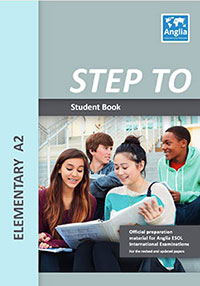Elementary English Exam Level A2 CEFR 
What does Elementary test?
The Anglia Elementary exam is A2 level on the Common European Framework of Reference. Over the four skills of reading comprehension, writing, listening and speaking (optional). This is mapped to the A2 level on the CEFR (common European framework) and covers; simple and direct exchange, the ability to understand sentences and answer frequently asked questions. The new items that this level tests are:
- an increased vocabulary
- future tenses
- the first conditional
- the present perfect
- the past continuous
- used to
- modals - should and must
- expressing purpose
- question tags
- relative pronouns
- reflexive pronouns
- adverbs
- some phrasal and prepositional verbs
What does the candidate have to do in the Elementary test?
- write a short composition
- read a text
- match letters
- answer multiple choice questions
- fill in gaps
- rearrange word order
- answer true/false questions
The candidate has sufficient active vocabulary and structural understanding to:
- write a short connected text on descriptive or narrative topics
- read and understand a text from a familiar range of topics
- ask and answer questions about past or present events
- distinguish between and use a variety of tenses in familiar contexts: past, present and future
- express basic intention, purpose, obligation, preference and advice
Grammar and Structures List
| Grammar and Structures | What are they used for? | Some examples |
| VERBS | ||
Future simple -will | Talking about future plans Talking about future plans which have conditions on them | What will you do when you are older? |
| Future of intention 'be going to' | Talking about future intentions | I'm going to see a film this evening. |
| Past continuous - when, while | Talking about past activities which were interrupted | I was having my breakfast when the postman knocked. While I was studying, he played loud music. |
| Used to | Talking about long past habits and states | My father used to work in an office. My sister used to have long hair. |
| Modals -should, must | Expressing obligation and advice | You must study hard if you want to go to university. You mustn't worry about it. You should always lock your car. |
| Infinitive of purpose | Talking about the purpose of doing something | Jane went to America to learn English. |
| QUESTION TAGS | ||
| Isn't he? Aren't you? Do you? Etc | Asking for confirmation of a negative or positive statement or inviting an answer to a question | You are coming to my party, aren't you? You haven't seen my car keys, have you? |
| RELATIVE PRONOUNS | ||
| Which, who, that | Identifying people and objects | This is the best cake that I have ever eaten. Jack is the one who is sitting at the back of the class. |
| REFLEXIVE PRONOUNS | ||
| Myself, himself, herself, etc. | Identify people and objects | He hurt himself. |
| ADVERBS | ||
| Adverbs of frequency, e.g. never, sometimes; adverbs of manner, e.g. quietly, slowly; adverbs of time, e.g. today, now. Adverbs of degree, e.g. a lot, a little (and associated word order) Simple modal adverbs e.g. possibly, probably, perhaps Adverbs of sequence e.g. first, finally, next, then | Describing how often, how, when and to what extent people do something. Indicating degree of possibility. Ordering events and understanding instructions and directions | I have never flown in a plane. At the moment, the children are playing in the park. The children walked home slowly. He is probably in his room. First, I had my breakfast. Go down the road and then straight on. |
| ago, never, for, before, after | Talking about when things happened | I went to Paris six years ago. He lived there for 10 years. |
| The contrast of too/enough | Talking about the extent of something | The student isn't trying hard enough, he never does his homework. The student is trying too hard, he will make himself ill. |
| PREPOSITIONS | ||
Prepositions as used in some very common phrasal verbs and prepositional phrases. | You must put on a hat if you go out in the sun. I am very fond of my pets. | |
| INTENSIFIERS | ||
| e.g. really, quite, so, very | Indicating degree | It is really hot today. |
| SPOKEN DISCOURSE | ||
| Markers e.g. right, well. Use of substitution. | Structuring conversation. Responding appropriately | "Right, has everyone got a book?" I think so. I hope so. |
| FORMAL IDENTIFICATION | ||
| First name, surname, age, date of birth, address, postcode, country, nationality. | Coping in formal situations especially when filling in forms | Date of Birth: 30.10.78 |
A good example of an essay at Anglia Elementary Level:
N.B. This is an example of a genuine candidate's essay at this level. Therefore, the language may contain grammatical, lexical or stylistic errors, originally made by the candidate him/herself.
The Birthday Party My favourite birthday party was yesterday. I had a great time. 101 words |
Elementary Level Exam Past Papers (for students)
Link to A2 Level English Practice Tests (exam papers, audio file and marking keys)
Link to Elementary level Speaking test
Exam Past Papers (for teachers)
Link to past papers for teachers
Speaking video example
Link to a video of an Elementary speaking exam

